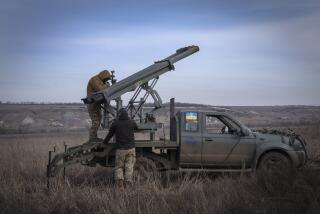A Ticking Bomb in Russia
- Share via
The United Nations, spurred by Washington, is pushing Iraq to let inspectors scour the country for its biological and chemical weapons. But what Iraq has may be peanuts compared with the stockpiles in Russia.
Inside Russia--but not far from Afghanistan--are 2 million artillery shells filled with nerve gas such as VX and sarin. The United States has spent hundreds of millions of dollars to design a plant to destroy those chemical weapons before they fall into the hands of other nations or terrorists. But for the last three years, Congress has blocked additional spending and some involved in building the facility are now being laid off.
The main bottleneck is in the U.S. House of Representatives. It should agree to resume funding for the plant in the Russian town of Shchuch’ye, near the border with Kazakhstan, that would destroy the deadly armaments.
Since the Cold War ended, the United States has helped finance Russia’s destruction of nearly 6,000 nuclear warheads once aimed at the U.S. Hundreds of missiles, launchers and missile-firing submarines also have been destroyed. The Bush administration deserves praise for supporting this program.
The U.S. record on destroying chemical weapons like those in Russia is dismal, thanks to congressional reluctance to spend promised funds on destruction.
For the sake of comparison, U.N. inspectors reported in 1999, soon after they left Iraq for the last time, that Baghdad had not accounted for at least 15,000 artillery rockets that had been its preferred delivery method for nerve gas and for more than 500 artillery shells filled with mustard agents. There is little doubt Iraq has continued producing sarin and VX gases in the years since, but the Russian stockpile would be hard to match.
A State Department official said last month that the United States has spent more than $6 billion to ensure that nuclear, chemical and biological weapons materials and technology in the former Soviet Union are safe from theft or surreptitious sales by underpaid workers in economically ravaged nations. That’s money well spent.
Several Republican congressmen have complained, however, that Russia has not fully accounted for all weapons of mass destruction and has not provided practical plans for destroying those they agreed to scrap.
Congress in 1993 required that the president certify that states of the former Soviet Union were spending money to destroy weapons and were not replacing them before the U.S. allotted money for destruction. The president was allowed to waive certification if need be, but Republicans on the House Armed Services Committee have ordered additional conditions before U.S. money can be spent on destroying Russian chemical weapons.
The Bush administration is seeking the ability to waive those conditions as well if national security so requires. Some conditions are difficult or impossible to meet, such as a minute detailing of the stockpile that former Democratic Sen. Sam Nunn of Georgia says the Russians may not have or be able to put together.
Congress should grant at least a temporary waiver, preferably a permanent one. The longer the weapons exist, even in heavily guarded facilities thought to be secure, the greater the danger an enemy nation or terrorists will acquire them.
More to Read
Sign up for Essential California
The most important California stories and recommendations in your inbox every morning.
You may occasionally receive promotional content from the Los Angeles Times.













